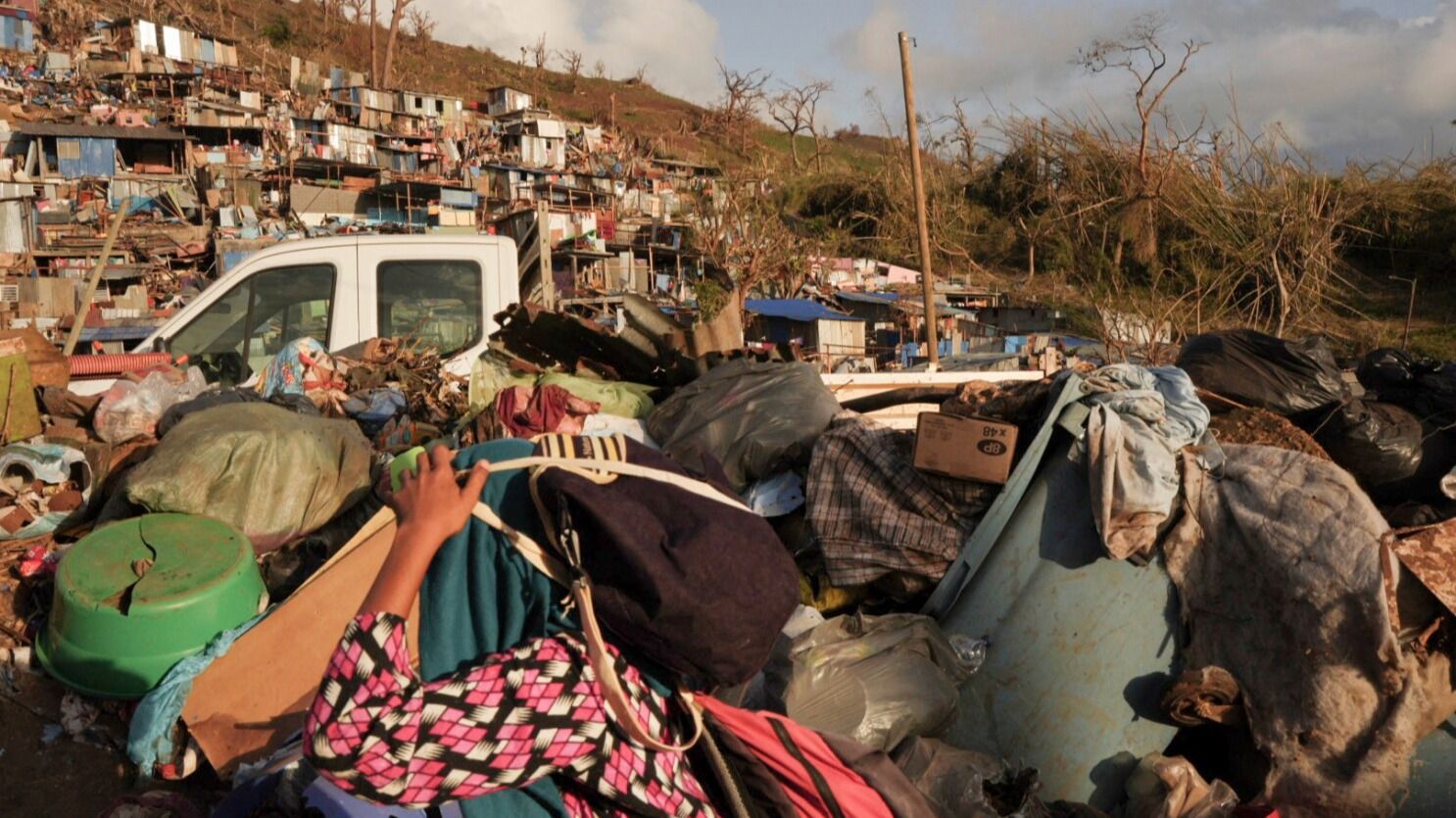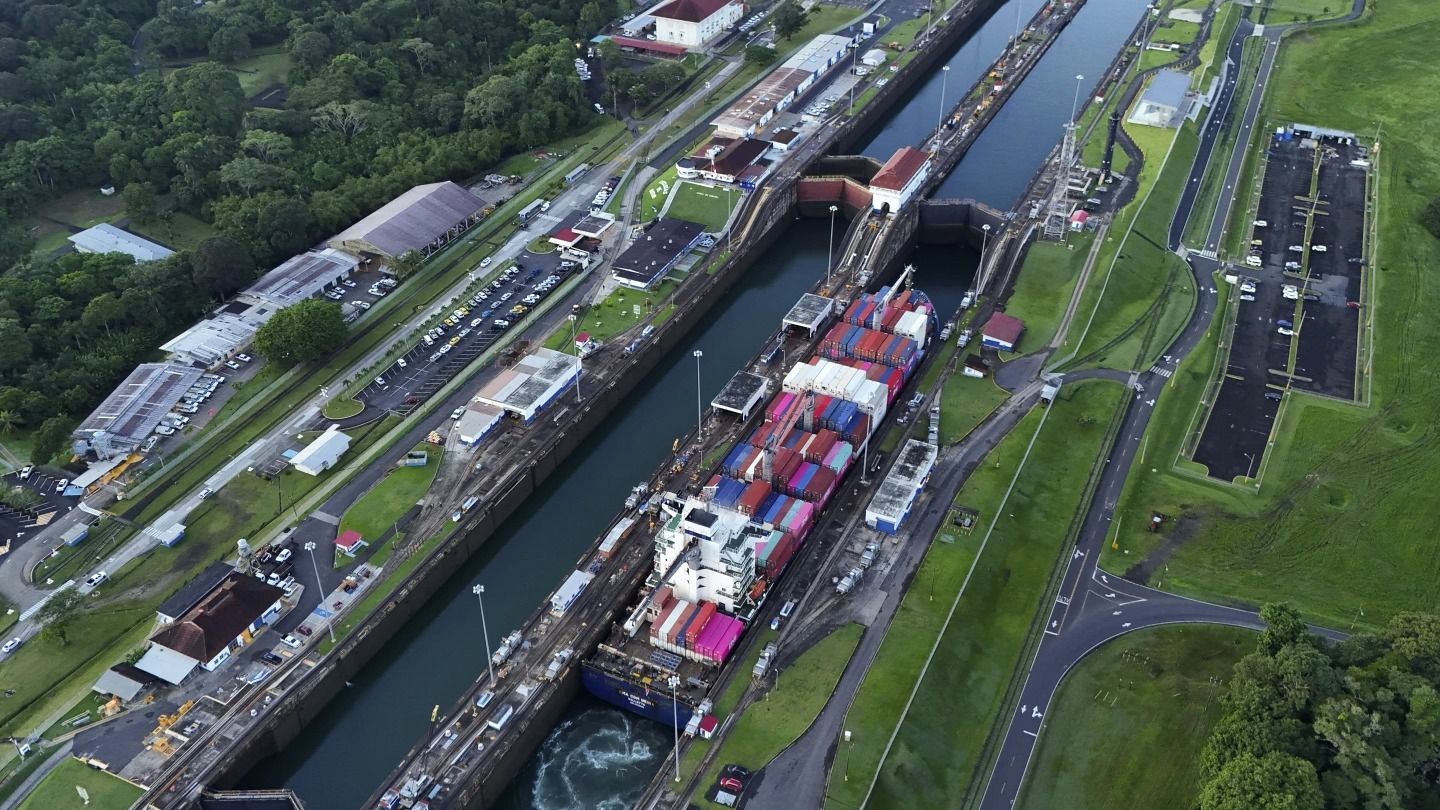They clustered around water taps, rare sources of electricity and each other. Four days after the strongest cyclone in nearly a century ripped through the French island territory of Mayotte off the coast of Africa, survivors recalled the horror of the storm that caught many by surprise.
Associated Press journalists reached the humid capital before dusk, as French military personnel and others rushed to clear fallen palm trees from roads ahead of French President Emmanuel Macron’s visit Thursday.
Streets were lined with the rubble of informal settlements whose migrant populations complicated the efforts to count the dead.
“We lived something very apocalyptic,” said Samuel Anli, 28, who rode out Saturday’s storm in a windowless office for hours as shrieking wind gusts exceeding 220 kph (136 mph) tore away doors and walls.
He and others held the door to their small office shut, fearing for their lives. “We thought if it lasted one or two hours more we’d all be dead,” he said. His home was partly destroyed and three of his relatives were injured by flying metal.
On Wednesday, French authorities described the storm as a “catastrophe of exceptional intensity.”
“The island is devastated,” they said, putting the confirmed death toll at 31 but noting that it could be much higher, partly because of the Muslim practice of burying the dead within 24 hours.
Some survivors and aid groups have described hasty burials and the stench of bodies.
Mayotte, located in the Indian Ocean between mainland Africa’s east coast and northern Madagascar, is France’s poorest territory and is a magnet for migrants hoping to reach Europe.
The cyclone devastated entire neighborhoods as many people ignored the warnings, thinking the storm wouldn’t be so extreme.
Days after it passed and destroyed or damaged even sturdy structures such as health centers, residents were left to pick their way through a landscape in search of food. Phone and internet service remained spotty.
Among the damaged and destroyed homes in Mayotte’s capital, Mamoudzou, people lined up with jugs to get water Wednesday or waited to charge their phones. Other lines stretched for hours at working gas stations.
The French government deployed gendarmes and other security forces Wednesday to secure food distribution points and assure order in areas where crowds were massing to find fuel or phone signals, the Interior Ministry said in a statement, noting also that more than 8,800 people were being housed in emergency shelter.
Dozens of French military personnel set up camp at the primary airport on Mayotte’s main island, Grand Terre, which remained closed due to damage, leaving most residents with little hope of going anywhere soon. Roads were also widely damaged.
French Prime Minister François Bayrou has said more than 1,500 people were injured, more than 200 critically. But authorities fear hundreds or even thousands of people have died. Authorities said 100,000 were living in a “precarious situation.”
On the French island of Reunion, about a three-hour flight away, loved ones gathered to donate aid to Mayotte’s survivors. Some said their families in Mayotte had no food or water and that it had taken days to contact them.
“It is difficult because I feel helpless,” said 19-year-old Khayra Djoumoi Thany.
Anrafa Parassouramin said she feared for her relatives in Mayotte. “We are also afraid of disease outbreaks, because people are drinking water from wherever they can get it, and it’s not necessarily potable water,” she said.
French Health Minister Geneviève Darrieussecq has raised concerns about the risk of a cholera epidemic on the archipelago, which had an outbreak of a highly drug-resistant strain earlier this year.
French authorities said distribution of 23 tons of water began Wednesday. The French minister for overseas matters, François-Noël Buffet, told French radio Europe 1 that the water supply system was “working at 50%” and presented a risk of “poor quality.” Electricity has been partially restored.
Late Wednesday, Buffet announced a “state of extraordinary natural disaster” for Mayotte, an emergency declaration specifically for French overseas territories she said had never been activated before. The measure allows authorities to speed up assistance and cut through administrative hurdles.
“Faced with this extraordinary situation, extraordinary means must be deployed to rapidly reestablish essential services and put in place a sustainable reconstruction plan for Mayotte,” she said in a statement. The decree will initially be in place for a month.
Mayotte’s hospital was badly damaged. A field hospital should be operational by early next week, Buffet said.
A navy ship was due to arrive in Mayotte on Thursday with 180 tons of aid and equipment, according to the French military.
Macron will travel to Mayotte along with the aid shipment and visit the hospital and a destroyed neighborhood, his office said. “Our compatriots are living through the worst just a few thousand kilometers away,” Macron said in a statement.
On Tuesday evening, a program on public broadcaster France 2 raised 5 million euros ($5.24 million) in aid for Mayotte through the Foundation of France charity, the channel said.
Survivors Recount ‘Apocalyptic’ Cyclone That Ripped Through French Territory of Mayotte world-news World News | Latest International News | Global World News | World Breaking Headlines Today




